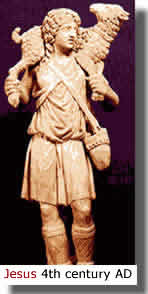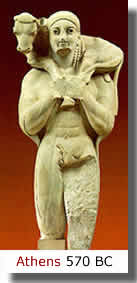| |||||||||||||||||||||||||||||||||
| Guesses > The End > Next Time You're in Church |
| |
Next time you're in Church
|
| St. Socrates |
|
Like other ancient religions, Christianity's fundamental ideas—it's rites and sacraments, it's godman and salvation—were exactly the ideas common in the time and place it began. Christianity is an ancient pagan religion.
|
|
And since you don't and I don't search for meaning in the historical Dionysus or the historical Osiris, we cannot now reasonably poke and prod our tradition for meaning in the historical Jesus. Which sucks. The Christian legends make up the myth that carries meaning in western culture and, clever us, we've convinced ourselves that myth has is no more meaning than all the other silly pagan superstitions. Isn't that swell? But Western civilization's cause-and-effect reasoning is fundamentally "empiric-rationalism." We believe stuff we can touch and see and measure. We know how to reason about stuff we can touch and see and measure. You can't put a ruler on "good" and "bad." It is in principle impossible for our rationalism, our western scientific method, to find good and bad, right and wrong. It's not that there aren't those things, it's that we don't know how to think about them. Saint Socrates Mr. E. Razmus said it first. I'll say it again.
Next time you're in church you could whisper
it too. "Saint Socrates, pray for me."
Go in peace. The mass has ended. |



